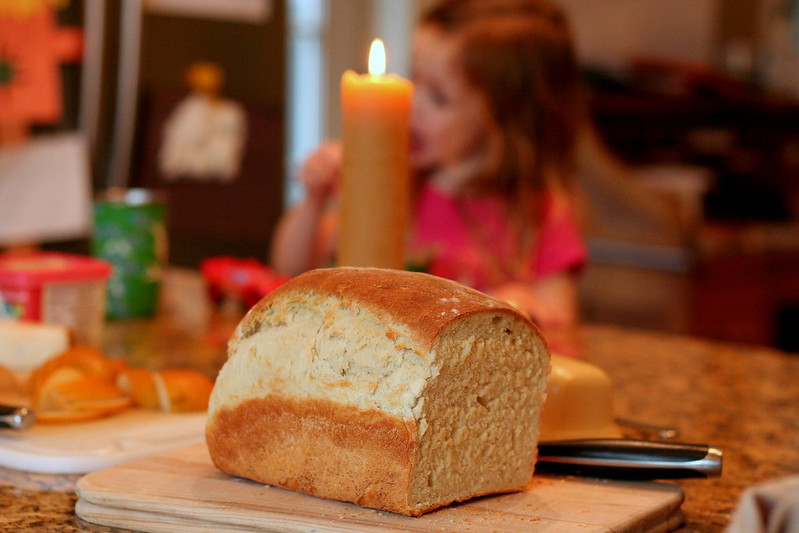I shared a special photograph on facebook this week.
My son, a small smile, and a slice of warm, wheat bread.
After nine years with no bread or pizza crust, no pasta or ice cream cones, our boy successfully completed a food challenge for wheat at the children’s hospital.
No more allergy.
I started baking bread the very next day.
There are other allergies. More severe allergies. There will be more food challenges. But this is something new. Something wonderful.
Something delicious.
***
I once wrote about my son and his allergies for the website Deeper Story. It’s one of my favorite things.
I’m sharing it again, and on my own website, because the truth I was trying to discover then feels even more important now as we navigate this change.
We haven’t arrived at the end of this story, but we have begun a new chapter.
The full story remains complicated. A little bit beyond my grasp. I am comforted to remember that the very best stories are never the easy ones. Not the easy ones to tell. Not the easy ones to hear. Certainly not the easy ones to live.
Here is that old, still continuing, story.
***
“Finally, the lessons of impermanence taught me this: loss constitutes an odd kind of fullness; despair empties out into an unquenchable appetite for life.”
– Gretel Ehrlich, The Solace of Open Spaces
I know two ways to tell this story.
The first way follows a trail of brokenness. Like a mountain path marked by rubble.
I don’t like to tell it this way. It feels so negative, even somehow un-Christian. But I do sometimes tell it like this, especially when you ask me directly about my son’s food allergies.
The twin themes of this story are loss and fear.
This is the story of eight years with no bread or pizza. No ice cream or cheese. No peanut butter-and-jelly, no granola bars. No yogurt. No mac-and-cheese or fish fingers or chicken nuggets. No birthday cake at the parties of his friends.
This is a story about epi-pens and calls to 911 and too many visits to the E.R.
I might leave out the details of that one mother-son date when I forgot the epi-pen. No happy ending (in this case, a stranger with a pediatric epi-pen in her purse) can erase the horror of five minutes spent listening to death rattle in your little boy’s throat and knowing it is entirely your fault.
The central episode of this first story might be the year my son spent eating lunch alone at a table on the stage of the school cafeteria. The only kid in the “nut-free” zone.
***
The second version of the story is more positive. You might call it pie-in-the-sky. Or, possibly, head-in-the-sand.
I’m not sure the story told this way is any closer to the truth, but it is easier to tell and easier to hear.
Highlights of this story include the gluten-free bakery only ten minutes from our small Pennsylvania town. They make pizza crusts and hamburger buns and even cupcakes without wheat or dairy or nuts. The pizza crusts are a little sad, but I will leave that part out.
This second story will make your mouth water. I will tell you about our special fried chicken and meatballs made without bread crumbs. I will tell you about a little concoction we call “pizza rice.” I will tell you how much my son adores his seaweed snacks. I will tempt you with my recipe for pumpkin bars.
***
Neither story gets it right. Neither one touches the heart of our experience these eight years. The first points out all that is missing. All that is twisted and wrong. The second tries to distract you from the brokenness with a pile of deliciousness.
Both versions leave me hungry for the truth.
I think the true story follows a third way. As so many of the best stories do.
I’ve been feeling out the contours of this other way for years, as if searching for a secret place. The place where loss is still loss but is also, somehow, gain. The place where grief remains grief but where it is also the color of joy.
How do you tell a story built on contradictions?
I can’t send my son to summer camp, but my son lacks no good thing.
I pray every day that my son will be healed, but I believe the answer I’ve long been given: he is already healed.
Our family table is ringed round with fear and loss. Death and sickness. We never sit down to eat without noticing those shadows at our feet. And yet the food we eat at this table is good. Each bite tastes like a gift.
How can I ever account for the wonder of a table prepared in the presence of my enemies?
***
When my son tells the story of his old school, he tells it like this:
“Mom, remember when I ate lunch on the stage in the cafeteria?”
“Yes,” I say. “How could I forget.”
“I was all by myself. It was like eating on top of a mountain! It was so quiet there.”
Watching him tell his story, I see a far-off gaze. I see something around his mouth. It is like the memory of a smile.
As if he’s glimpsed some other, hidden world. Some truer place.


Oh gosh. Tears. I love this. It reminds me of the stories in the Bible- they have the same “third way” quality you talk about.
Mmm, yes, so true, Erin.
I love how you tell a story. “The place where grief remains grief but where it is also the color of joy.” Reading this reminds me of why we write – to express an emotion, a thought, an idea, a suffering, a joy, a journey.
Thank you, Diane!
Beautiful story, and beautifully written. Thank you for sharing this with us
Oh, my heavenly days! Yes!!!